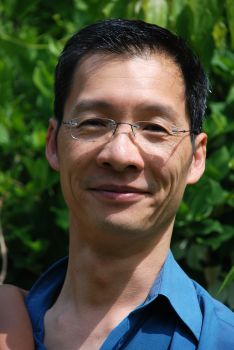New dementia procedure will speed up diagnosis
Posted on behalf of: BSMS
Last updated: Monday, 5 November 2012

Dr Dennis Chan - leading dementia project at BSMS
Brighton and Sussex Medical School (BSMS) is taking part in major research into faster and more accurate diagnosis for dementia patients, Prime Minister David Cameron announced last night (Sunday 4 November).
Speedier diagnosis will lead to earlier provision of best care and, in some cases, prolonged independent living.
Nationally, the time to diagnose dementia currently is very slow – up to 18 months in some cases – and even then the majority of people with dementia are undiagnosed. The new techniques aim to meet the Prime Minister’s Dementia Challenge of doubling the current diagnosis percentage rate.
Patients will be tested in new Brain Health Centres using mobile MRI scanners that can be parked outside local health centres close to patients’ homes. BSMS – run jointly by the universities of Sussex and Brighton – will oversee the testing of patients referred from community-based memory clinics. Patients will also be referred from a London-based hospital clinic.
Dr Dennis Chan, BSMS Senior Lecturer and Honorary Consultant Neurologist, will lead the project locally. Dr Chan runs a specialist Cognitive Disorders Clinic at Hurstwood Park Neurological Centre in Haywards Heath.
Dr Chan says: “Current diagnosis of dementia relies on traditional pen and paper memory testing and on visual inspection of scans, with the attendant risk of human fallibility.
“The diagnostic approach espoused by the Brain Health Centres is digital – quantitative and rapid – in contrast to the current qualitative and slow analogue way.”
There are currently 800,000 people in the UK with dementia, according to the Alzheimer’s Society, and the number is increasing. In addition to bringing benefits to patients, it is hoped the new system will bring significant savings to the NHS and to social care, plus increased time efficiency.
BSMS will work with two companies and with Imperial College and King’s College London to develop the new digital tools. The approach will combine state-of-the-art tests of memory and thinking with computerised analysis of MRI brain scans currently used in leading international research centres but not routinely in the NHS.
BSMS and the London universities, together with London-based IXICO, a world leader in medical imaging, and Cambridge Cognition, a leading British developer of neuropsychological tests, have been awarded a £2.1 million Government grant to build and test the prototype national dementia early diagnosis service.
The partners say they are confident the new testing will lead to rapid treatment and support for British dementia patients.
Patients attending a Brain Health Centre will undergo a high-resolution MRI brain scan followed by a more detailed cognitive test involving an iPad and a new version of Cambridge Cognition’s CANTABmobile™ iPad App, which, in less than 10 minutes, differentiates between patients with normal and abnormal memory.
The study will yield automated and accurate diagnostic reports identifying the different diseases causing dementia. IXICO and Cambridge Cognition say that the resulting report gives a “clear, easy-to-follow traffic light call to action for the Brain Health Centre staff to communicate back to the patient’s GP.”
The Alzheimer’s Society will support the project by ensuring the needs of patients and their carers are fully considered in the project and by undertaking an initial impact assessment on the 200 patients assessed. Project leaders aim to deploy the new equipment across all UK communities with below-average diagnosis rates in 2014.
Professor Alistair Burns, National Clinical Director for Dementia, says: “I am very impressed by the Brain Health Centre project which has the real potential to contribute to making the UK a world leader in dementia care by raising diagnosis rates – a key ambition of the Prime Minister’s Dementia Challenge.
“Combining innovative technologies in this way should help us to spot early signs of dementia, giving us time to offer patients better support and care.”
Dr Chan says: “Waiting lists for facilities such as my own are months long, so the time to diagnosis via a Brain Health Centre is greatly shortened. In the future, the roll out of the technology would mean that referral to specialists in clinics like my own is fast-tracked, thus permitting earlier delivery of best care.
“One of the great strengths of the project is the provision of state-of-the-art diagnostic tools to patients based in the community, thus getting rid of regional inequalities. At the moment, people living in rural areas may not have the same chance of accessing the same diagnostic services as those who live close to university hospitals and research centres such as the one I work in.”
Dr Chan added: “Computerised cognitive testing has much greater sensitivity to earlier disease than the brief pen and paper tests currently used in memory clinics. Similarly, quantitative 3D MR imaging may detect brain changes associated with different neurodegenerative dementias that may not be identified via the traditional approach of qualitative reporting on suboptimal scans.”

